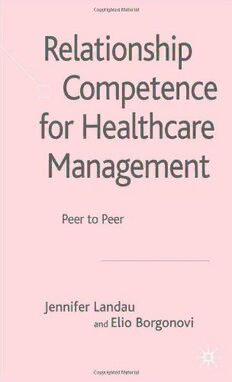
Relationship Competence for Healthcare Management: Peer to Peer PDF
198 Pages·2008·0.598 MB·English
Most books are stored in the elastic cloud where traffic is expensive. For this reason, we have a limit on daily download.
Preview Relationship Competence for Healthcare Management: Peer to Peer
Description:
Patients' problems are broader than the scope of the organizations that treat them. Healthcare organizations depend more and more on professionals, managers and health policy makers who can create a broad enough perspective within and between departments and organizations to make sense of patient needs. This book focuses on managing relationships between roles with equivalent organizational authority within and between healthcare organizations. Peer relationships tend to be explained by members of the organization as either effective because friendly or ineffective because unfriendly. Peer to peer relationships follow patterns of dysfunction, and are not as arbitrary or as personal as they are often perceived. The book provides the conceptual frameworks for identifying these patterns and for developing effective horizontal competence necessary for managing the relationship with peers. When peer to peer relationships are well managed, they produce appropriate and quality care at a sustainable cost to the healthcare organization.
See more
The list of books you might like
Most books are stored in the elastic cloud where traffic is expensive. For this reason, we have a limit on daily download.
